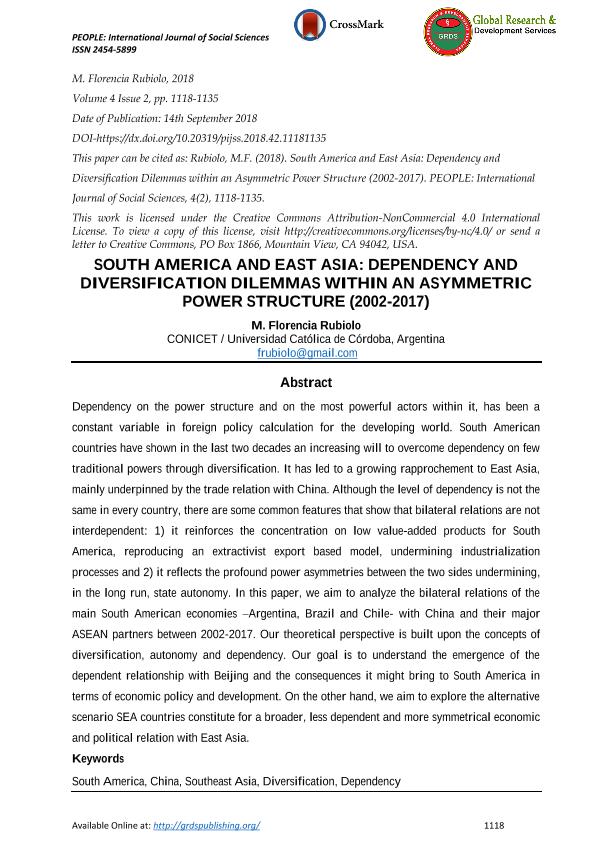Mostrar el registro sencillo del ítem
dc.contributor.author
Rubiolo, María Florencia

dc.date.available
2019-11-19T14:08:29Z
dc.date.issued
2018-09
dc.identifier.citation
Rubiolo, María Florencia; South America and East Asia: Dependency and diversification dilemmas within an asymmetric power structure (2002-2017); GDRS Publishing; PEOPLE: International Journal of Social Sciences; 4; 2; 9-2018; 1118-1135
dc.identifier.issn
2454-5899
dc.identifier.uri
http://hdl.handle.net/11336/89179
dc.description.abstract
Dependency on the power structure and on the most powerful actors within it, has been a constant variable in foreign policy calculation for the developing world. South American countries have shown in the last two decades an increasing will to overcome dependency on few traditional powers through diversification. It has led to a growing rapprochement to East Asia, mainly underpinned by the trade relation with China. Although the level of dependency is not the same in every country, there are some common features that show that bilateral relations are not interdependent: 1) it reinforces the concentration on low value-added products for South America, reproducing an extractivist export based model, undermining industrialization processes and 2) it reflects the profound power asymmetries between the two sides undermining, in the long run, state autonomy. In this paper, we aim to analyze the bilateral relations of the main South American economies –Argentina, Brazil and Chile- with China and their major ASEAN partners between 2002-2017. Our theoretical perspective is built upon the concepts of diversification, autonomy and dependency. Our goal is to understand the emergence of the dependent relationship with Beijing and the consequences it might bring to South America in terms of economic policy and development. On the other hand, we aim to explore the alternative scenario SEA countries constitute for a broader, less dependent and more symmetrical economic and political relation with East Asia.
dc.format
application/pdf
dc.language.iso
eng
dc.publisher
GDRS Publishing
dc.rights
info:eu-repo/semantics/openAccess
dc.rights.uri
https://creativecommons.org/licenses/by-nc/2.5/ar/
dc.subject
SOUTH AMERICA
dc.subject
CHINA
dc.subject
SOUTHEAST ASIA
dc.subject
DIVERSIFICATION
dc.subject
DEPENDENCY
dc.subject.classification
Otras Ciencia Política

dc.subject.classification
Ciencia Política

dc.subject.classification
CIENCIAS SOCIALES

dc.title
South America and East Asia: Dependency and diversification dilemmas within an asymmetric power structure (2002-2017)
dc.type
info:eu-repo/semantics/article
dc.type
info:ar-repo/semantics/artículo
dc.type
info:eu-repo/semantics/publishedVersion
dc.date.updated
2019-10-24T18:27:35Z
dc.journal.volume
4
dc.journal.number
2
dc.journal.pagination
1118-1135
dc.journal.pais
India

dc.journal.ciudad
Jaipur
dc.description.fil
Fil: Rubiolo, María Florencia. Consejo Nacional de Investigaciones Científicas y Técnicas. Centro Científico Tecnológico Conicet - Córdoba. Centro de Investigaciones y Estudios sobre Cultura y Sociedad. Universidad Nacional de Córdoba. Centro de Investigaciones y Estudios sobre Cultura y Sociedad; Argentina
dc.journal.title
PEOPLE: International Journal of Social Sciences
dc.relation.alternativeid
info:eu-repo/semantics/altIdentifier/url/https://grdspublishing.org/index.php/people/article/view/1541
dc.relation.alternativeid
info:eu-repo/semantics/altIdentifier/doi/http://dx.doi.org/10.20319/pijss.2018.42.11181135
Archivos asociados
